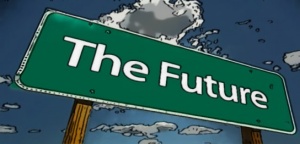Difference between revisions of "Language/French/Grammar/Future-Tense"
m (Quick edit) |
|||
| (2 intermediate revisions by 2 users not shown) | |||
| Line 1: | Line 1: | ||
[[File:the_future.jpeg| | [[File:the_future.jpeg|thumb]] | ||
In French, there are two ways to talk about something that will happen: '''Le Futur Proche''' (near future) and '''Le Futur''' (the future). As you dive into this lesson on [[Language/French/Grammar/Future-Tense|French Grammar → Future Tense]], you'll discover the intricacies of both forms. Once you've mastered the future tense, you might also be interested in exploring other aspects of French grammar, such as [[Language/French/Grammar/Plural-forms-of-adjectives-—-The-normal-case|plural forms of adjectives]], [[Language/French/Grammar/Comparative-and-Superlative-Adjectives|comparative and superlative adjectives]], and [[Language/French/Grammar/How-to-recognize-when-the-start-of-a-relative-clause-is-a-direct-object|recognizing direct objects in relative clauses]]. Bonne chance! 🇫🇷 | |||
In French there are two ways to talk about something that will happen: '''Le Futur Proche''' (near future) and '''Le Futur''' (the future). | |||
== LE FUTUR PROCHE == | == LE FUTUR PROCHE == | ||
It only requires to conjugate the verb aller (to go) in the present tense. It involves using the correct conjugation of aller + an infinitive (unconjugated verb). | It only requires to conjugate the verb aller (to go) in the present tense. It involves using the correct conjugation of aller + an infinitive (unconjugated verb). | ||
| Line 34: | Line 32: | ||
[[Category:French/Beginner]] | [[Category:French/Beginner]] | ||
==Other Lessons== | |||
* [[Language/French/Grammar/Double-object-constructions-with-no-preposition|Double object constructions with no preposition]] | |||
* [[Language/French/Grammar/Stressed-pronouns-standing-alone|Stressed pronouns standing alone]] | |||
* [[Language/French/Grammar/Plural-of-words-in-Al|Plural of words in Al]] | |||
* [[Language/French/Grammar/Directly-transitive-verbs-without-objects|Directly transitive verbs without objects]] | |||
* [[Language/French/Grammar/Subject-verb-agreement-—-Verb-agreement-with-fractions|Subject verb agreement — Verb agreement with fractions]] | |||
* [[Language/French/Grammar/Plural-of-Nouns|Plural of Nouns]] | |||
* [[Language/French/Grammar/Forms-of-créer,-nier,-scier,-rire,-etc|Forms of créer, nier, scier, rire, etc]] | |||
* [[Language/French/Grammar/Demonstrative-pronouns-with-—ci-and-—là|Demonstrative pronouns with —ci and —là]] | |||
* [[Language/French/Grammar/Typical-use-of-demonstrative-determiners|Typical use of demonstrative determiners]] | |||
* [[Language/French/Grammar/Adjectives-which-regularly-occur-before-and-after-the-noun,-but-with-a-change-of-meaning|Adjectives which regularly occur before and after the noun, but with a change of meaning]] | |||
<span links></span> | |||
Latest revision as of 20:05, 24 March 2023
In French, there are two ways to talk about something that will happen: Le Futur Proche (near future) and Le Futur (the future). As you dive into this lesson on French Grammar → Future Tense, you'll discover the intricacies of both forms. Once you've mastered the future tense, you might also be interested in exploring other aspects of French grammar, such as plural forms of adjectives, comparative and superlative adjectives, and recognizing direct objects in relative clauses. Bonne chance! 🇫🇷
LE FUTUR PROCHE[edit | edit source]
It only requires to conjugate the verb aller (to go) in the present tense. It involves using the correct conjugation of aller + an infinitive (unconjugated verb).
- On va regarder la télé ce soir = We are going to watch TV tonight
LE FUTUR[edit | edit source]
The future is used to talk about more distant future events. Its English equivalent is “I will ______.” Le futur involves using the infinitive and then adding the correct ending.
The endings of the future tense (with the regular verb marcher (to walk) are:
Examples[edit | edit source]
- je marcherai = I will walk
- tu marcheras = you will walk
- il/elle/on marchera = he/she/it will walk
- nous marcherons = we will walk
- vous marcherez = you will walk
- ils/elles marcheront = they will walk
Videos[edit | edit source]
Other Lessons[edit | edit source]
- Double object constructions with no preposition
- Stressed pronouns standing alone
- Plural of words in Al
- Directly transitive verbs without objects
- Subject verb agreement — Verb agreement with fractions
- Plural of Nouns
- Forms of créer, nier, scier, rire, etc
- Demonstrative pronouns with —ci and —là
- Typical use of demonstrative determiners
- Adjectives which regularly occur before and after the noun, but with a change of meaning
